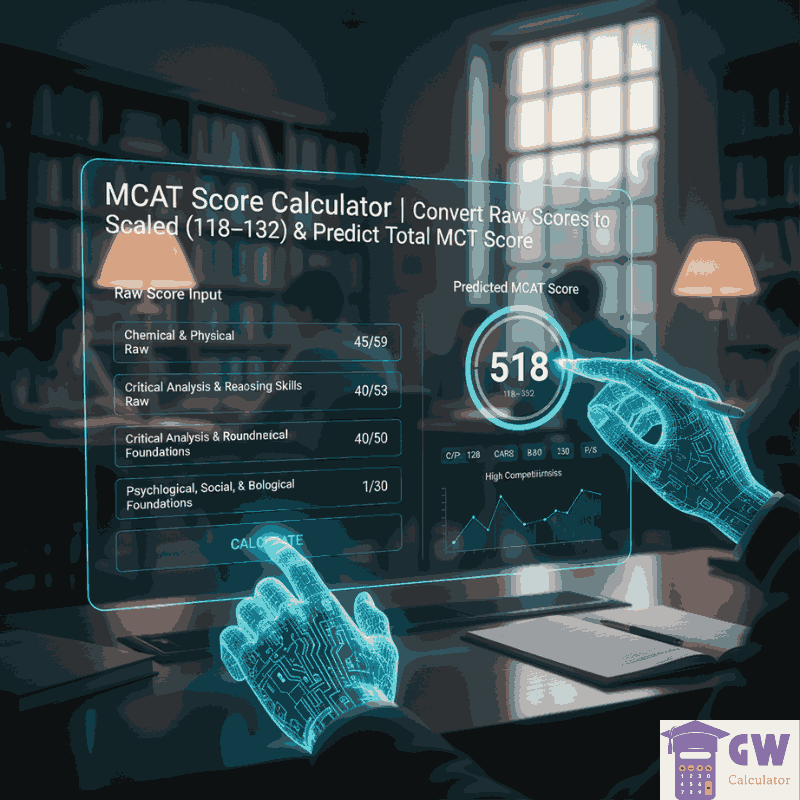The MCAT Score Calculator helps students convert their raw practice test scores into official MCAT scaled section scores (118–132) and calculate the total scaled score (472–528). By entering your raw correct answers for each section — Chemical/Physical, CARS, Biological/Biochemical, and Psychological/Social — you can estimate your official scaled score and overall performance. This gives you a precise idea of where you stand before test day and helps you plan your preparation more effectively.
👉 Use this tool here: MCAT Score Calculator
1. Understanding the MCAT and Why Scoring Conversion Matters
The Medical College Admission Test (MCAT) is a standardized exam required by nearly all medical schools in the U.S. and Canada. It measures critical thinking, problem-solving, and knowledge in biological, chemical, psychological, and social sciences — all core skills for aspiring doctors.
However, unlike standard exams, MCAT results are not reported in raw scores. Instead, your number of correct answers (raw score) is converted to a scaled score to account for variations in exam difficulty across different test forms.
This process, known as score equating, ensures that a scaled score (like 128) means the same level of performance regardless of which test version you take.
That’s why using an MCAT Score Calculator is essential — it lets you estimate your official scaled result instantly from your raw scores and provides insights into how close you are to your target score.
2. How MCAT Scoring Works: From Raw to Scaled and Total Score
2.1 Raw Scores Explained
Your raw score is the total number of questions you answer correctly in a given section. The MCAT does not penalize wrong or skipped answers — so you should attempt every question.
Each MCAT section has a set number of questions:
- Chemical and Physical Foundations of Biological Systems (C/P): 59 questions
- Critical Analysis and Reasoning Skills (CARS): 53 questions
- Biological and Biochemical Foundations of Living Systems: 59 questions
- Psychological, Social, and Biological Foundations of Behavior: 59 questions
2.2 Scaled Score Range
Each section’s raw score is converted to a scaled score between 118 and 132, and the midpoint is 125. The total MCAT score is the sum of all four scaled sections, ranging from 472 to 528, with 500 being the midpoint.
Formula:
Total Scaled Score = C/P Scaled + CARS Scaled + Bio/Biochem Scaled + Psych/Soc Scaled
2.3 Example of Conversion
If a student scores:
- C/P: 45 correct → 128 scaled
- CARS: 40 correct → 126 scaled
- Bio/Biochem: 47 correct → 129 scaled
- Psych/Soc: 50 correct → 130 scaled
Then:
Total MCAT Score = 128 + 126 + 129 + 130 = 513
This total (513) is above average and places the student in a competitive percentile range for many medical schools.
3. MCAT Raw-to-Scaled Conversion Explained (Simple Formula + Table)
While the AAMC’s official conversion data is not publicly released, you can estimate your scaled score using this simplified formula:
Formula:
Estimated Scaled Score = (Raw Correct / Total Questions) × (132 - 118) + 118
Example Calculation:
If you answer 45 out of 59 correctly in a section:
= (45 / 59) × 14 + 118 ≈ 128.7 → 129 scaled
Below is an approximate conversion chart based on typical MCAT test distributions:
| Section | Total Questions | Raw Correct | Estimated Scaled Score |
|---|---|---|---|
| Chemical/Physical | 59 | 45 | 128 |
| CARS | 53 | 40 | 127 |
| Biological/Biochemical | 59 | 47 | 129 |
| Psychological/Social | 59 | 50 | 130 |
| Total (Estimated) | — | — | 514 |
This sample is only for practice and estimation. Actual conversions may slightly differ depending on the test form difficulty.
You can automate this process instantly using the MCAT Score Calculator — simply input your raw scores, and the tool will calculate section and total scaled scores within seconds.
4. How to Use the MCAT Score Calculator (Step-by-Step Guide)
- Open the tool: Go to MCAT Score Calculator.
- Enter your raw correct answers for each section:
- Chemical/Physical (0–59)
- CARS (0–53)
- Biological/Biochemical (0–59)
- Psychological/Social (0–59)
- Click “Calculate.”
The calculator automatically converts each raw score to its corresponding scaled score. - View your results:
It shows individual section scores (118–132) and your total scaled score (472–528). - Analyze your results:
Identify which section needs the most attention to raise your overall total.
This calculator helps pre-med students save time, avoid manual calculations, and track performance improvement after each practice test.
5. Understanding What Makes a Good MCAT Score
5.1 Score Ranges and Competitiveness
- Average MCAT score: Around 500–506
- Competitive for MD programs: 511–512+
- Highly competitive programs (top-tier schools): 515–528
5.2 Percentile Insight
Each scaled score corresponds to a percentile. For example:
- A total score of 500 ≈ 50th percentile
- 510 ≈ 78th percentile
- 518+ ≈ 95th percentile
Percentile ranking gives context to your score — it shows how you performed compared to other test-takers nationwide.
5.3 Balancing All Sections
A high total score comes from balanced performance. Scoring 132 in one section won’t offset a 120 in another. Strive for consistency across all four sections.
6. Using the MCAT Score Calculator to Improve Preparation
Using a score calculator isn’t just about seeing your result — it’s about using data to guide smarter prep.
Here’s how students can use it strategically:
- Track progress: Log your estimated scaled scores from each practice test to see trends.
- Set target goals: Compare your total to your goal score and adjust study plans accordingly.
- Identify weak sections: If CARS is consistently lower, dedicate extra study time there.
- Benchmark improvement: Use the calculator weekly to measure growth.
- Plan your test date: Once your predicted score stabilizes near your target, it’s time to register.
7. Common Scoring Scenarios (Realistic Examples)
| Case | GPA | Raw Scores (per section) | Total Scaled | Interpretation |
|---|---|---|---|---|
| Case 1 – High Scorer | 3.8 | 52, 46, 54, 56 | 520 | Excellent – top-tier candidate |
| Case 2 – Average Applicant | 3.5 | 45, 39, 46, 48 | 510 | Competitive for many MD schools |
| Case 3 – Improvement Focused | 3.4 | 39, 34, 40, 42 | 499 | Needs targeted improvement |
By comparing results, students can realistically gauge what score range makes them competitive for their desired programs.
8. Tips for Students to Improve MCAT Scores and Performance
- Practice with official materials: Use AAMC full-length tests for the most accurate prediction.
- Analyze section trends: The calculator highlights your weakest areas — spend more time improving those.
- Set incremental goals: Increasing your total score by even 3–4 points can dramatically change your percentile.
- Simulate real conditions: Timed tests give raw scores closest to real exam performance.
- Use study planning tools: Tools like Study Schedule Calculator, Semester Planner, and Grade Needed Calculator can help organize prep effectively.
- Focus on endurance: MCAT is a long exam (7+ hours). Build stamina through regular practice.
9. Frequently Asked Questions (FAQs)
Q1: How many questions are in the MCAT?
There are 230 multiple-choice questions across four sections, totaling about 7.5 hours with breaks.
Q2: How accurate is an MCAT score calculator?
It provides reliable score estimates based on historical conversion patterns, making it 90–95% accurate for practice test prediction.
Q3: Does every section have equal weight in total score?
Yes, all four sections are weighted equally. Each contributes one-fourth of your total score.
Q4: What is the minimum passing or average score?
There is no “pass” or “fail,” but the national average is around 500, while competitive medical schools look for 510+.
Q5: Can I use this calculator for official score reporting?
No, this is an unofficial estimation tool for practice and preparation only. Your official score is released by AAMC.
10. Credible Resources and References
For verified MCAT scoring information, visit:
- AAMC – How the MCAT Exam is Scored: https://students-residents.aamc.org/mcat-scores/how-mcat-exam-scored
- AAMC – MCAT Exam Score Scale: https://students-residents.aamc.org/mcat-scores/mcat-exam-score-scale
- AAMC – MCAT Percentile Ranks: https://www.aamc.org/media/83291/download
- AAMC – Official MCAT Practice Exams and Guides: https://students-residents.aamc.org/prepare-mcat-exam



